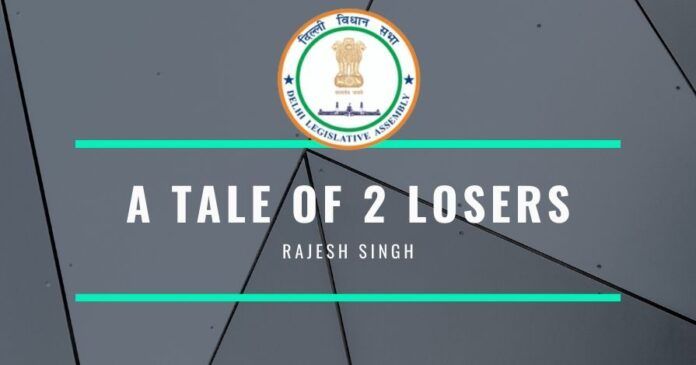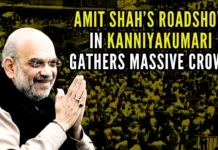
Soon after being drubbed in the Delhi Assembly elections, the Congress party said it was disappointed by the results but not depressed. Actually, it needn’t be disappointed either. It had fought hard to lose and succeeded. It was not an easy task to repeat the zero-seat performance of 2015. Not only did Congress manage that feat but nearly all its candidates lost their security deposits. Besides, its vote-share plummeted to almost half of its 2015 level.
All indications were available from the start of the election process that the Congress was not serious about the contest and was in the fray as a mere formality. It chose candidates that had been already discredited, its senior leadership at the central level made only guest appearances at rallies and meetings, it had appointed a person with a poor track record as its Delhi chief in the run-up to the polls, and it made no attempt to quell the impression that it had given up even before the fight began. The cat was let out of the bag after voting ended when some of the Congress’s senior leaders remarked that they did not want the anti-BJP votes to get split and result in gains for the BJP.
The Congress central leadership’s attitude caused immense harm to the morale of the rank and file of the party workers at the grassroots level. It must have also disappointed the candidates who were hoping for full-fledged backing of their tall leaders. In their burning desire to see the BJP defeated, the Congress leadership appears to have gone down a precipitous path that signaled the party’s death-knell.
A party that ruled Delhi for three consecutive terms under Sheila Dikshit’s leadership and governed India for most of the time since independence, has surrendered to the Aam Aadmi Party (AAP). It believes that by doing so it has dramatically harmed the BJP. What it does not realise is that while the BJP may yet bounce back in the near future, such tactics will ensure that Congress never regains its lost glory.
Had the Congress been serious, it could have given a fight to the AAP, particularly in constituencies dominated by the Muslim community. That might have resulted in some gains for the BJP due to a split in minority votes but Congress could have also gained ground — and even won a few seats. But its senior leadership apparently believes that it is better to remain a zero than to have the BJP have the pole position. The party prefers to kill itself to harm the ruling party at the Centre. One wonders how the ground worker of the party, who gives his or her all for the Congress, sees this ‘sacrifice’.
Of course, the Congress, for the record, has rubbished the charge that it deliberately refused to put its best foot forward. Are we then to believe that its best effort can only result in a zero number of seats? If that is indeed the case, the party might as well wound up its operations in Delhi and free its workers to migrate elsewhere.
That said, the BJP’s performance too has been dismal — and only better when compared to the Congress. It managed to increase its seat tally marginally, though its vote-share went up considerably (going by the figures at the time of writing). Unlike the Congress, it fought hard, but on issues that did not fully resonate with the voters. While the AAP spoke of its professed achievements in the delivery of basic services to the people of Delhi — water, electricity, transport, health — some BJP leaders dubbed the contest as an India-Pakistan match. One of them even fell short of likening Arvind Kejriwal to a terrorist.
The polarisation that the BJP had hoped for in its favour in the wake of the Shaheen Bagh incident, did not happen. While the minority voters remained with the AAP, the others did not en masse flock to the BJP. The anti-India slogans at the protest site would have worked to the BJP’s advantage had this been a national election. But with local issues in dominance, the strategy failed to work against the AAP. It was reported in the media that Kejriwal had told voters that they could back Modi at the Centre but must vote for the AAP in Delhi on the strength of his party’s performance on local issues.
The AAP had at least one sound reason for harping on local matters — the poor performance of municipal corporations controlled by the BJP. The latter had enough time to pull up its socks and ensure that the corporations worked efficiently and be seen to deliver results to the common man in providing quality civic amenities. That never happened and the party paid a price for the failure.
If the BJP’s messaging was misplaced, matters were made worse for it with the absence of a strong local leader. The party banked on Prime Minister Narendra Modi to revive its fortunes, and his rallies did help the party gain some seats. But the voters were clear in their mind: they supported Modi at the Centre but needed a local BJP face who could be an alternative to Kejriwal. Delhi BJP chief Manoj Tiwari and member of Parliament was not seen as a credible option. The BJP may argue that it lost in 2015 despite having Kiran Bedi as its chief ministerial candidate. However, it had lost not because of her but largely due to the hasty manner in which she was presented to the voters; in fact, the voters had interpreted it as a desperate move by a party on the verge of defeat. It must be remembered that the Congress had its long stint in power in Delhi after it projected Sheila Dikshit as its chief ministerial candidate. The BJP too had, in the past, clear local leaders such as Madan Lal Khurana and Sahib Singh Verma.
Having won with a resounding margin, Chief Minister Kejriwal and his team have a huge responsibility. The voter is unforgiving, and it may not be long before dissatisfaction sets in. The AAP runs the risk of falling into the pit of complacency and arrogance. How it conducts itself in the coming days and handles its relationship with the Centre will determine its future.
Note:
1. The views expressed here are those of the author and do not necessarily represent or reflect the views of PGurus.











Kejriwal targeted women voters with Freebies, but most importantly he improved schools and healthcare. Women value a lot about the quality of education their children are getting and ease in healthcare. Remember when anybody gets sick in family, its the woman that has to take care.
Modi is winning on women votes in National elections. In state, BJP will have to provide better education and healthcare, and also market it properly so that people know they did it. Look at Kejriwal’s marketing. Otherwise, BJP will win national and keep losing states. Its stupid to fight state elections on national issues.
loss in Delhi highlights two major points for BJP a) Without a credible local face you cannot win a local election b) Muslims will always vote against BJP and enmasse too do whatever you want for their welfare they will not vote for BJP do it is better to stop saying Sab ka Vishwas like stuff ,they hate BJP look at the way Sareen Baat demonstraters ran enmasse to vote against BJP inspite of them being majority women who benifited from the triple talaq bill, So BJP must give up the notion of winning over the Muslim vote, the sad part is that Hindus don’t vote as Hindus but muslims vote as muslims
The analysis is simple. Economy is in bad shape and Modi feels all is well. He thinks he is an absolute ruler. He is becoming another Indira Gandhi and turning India into an authoritarian state controlled by corrupt and ineffective bureaucrats. Time for fresh ideas like in the times of Narasimha Rao, who was advised by Swamy. Only free market economy can make India great not socialism in the guise of hyper nationalism.
Modi and Shah are now drunk with absolute power. They left economy to winds and just hanging on to their threat of Pakistan, which is not at all of any consequence now. It is high time they respect dissent and take measures to revive economy by taking the counsel of Swami.
Did sanatan dharma lose or win?
Prashant Kishor a major link between AAP, INC and BJP (earlier ). His I-PAC has some ground breaking AI models to predict voters behaviours. Plus the media campaign of “Laage raho Kejriwal” added to the image of political stability. While some constituencies favoured AAP by a huge margin, its the Overall vote share loss of Congress which shifted to AAP hurt the BJP the most. Moreover 85% of the younger generation seems to have a positive outlook towards Arvind Kejriwal. Deeper issues havent yet reached out to them all thanks to the “Saffron Terror” ruling and “Divisive politics” card played by AAP leaders repeatedly. Scoopwhoop and several memes pages did their best when it comes to memes on Manoj Tiwari.
Then there was the image of “David”( AAP ) vs “Goliath”( BJP with his brand of ministers and neighbouring CMs ) India is a youthful population and Arvind Kejriwal and i-PAC campaign was fully targeted at them. This brand of “Seculars” dont care what your religion is, but whats your social image and whats trending! Last few week analysis of Twitter trends paint a clear image as to who had the upper hand.
The results ought to point out finally that it was Hindutva which triggered the massive victory at end, with AAP leaders going for “Temple Run”, “Hanuman Chalisa path by Kejriwal” and the obvious reference of A. Kejriwal referring to “Hindutva as modelled by BJP was against the religion”.
– Not a Party spokesperson, a common youth.
good analysis.